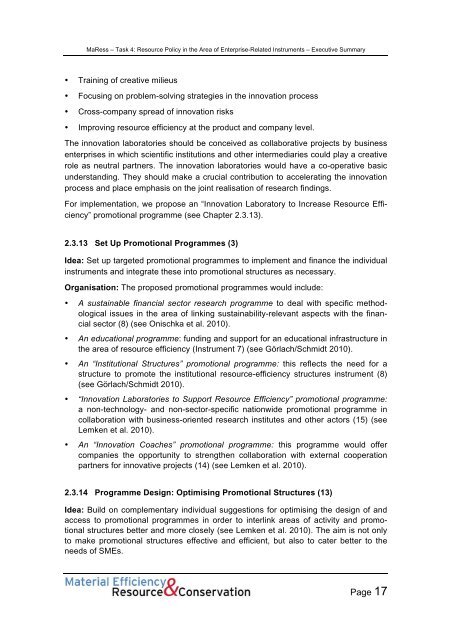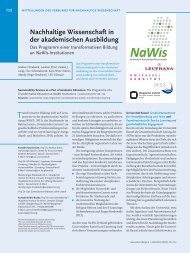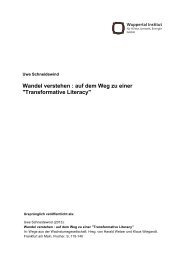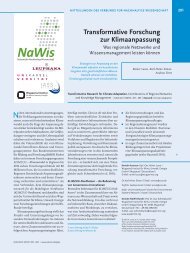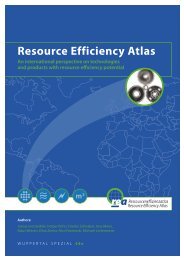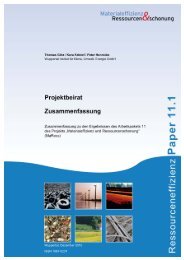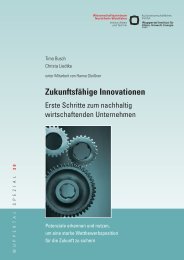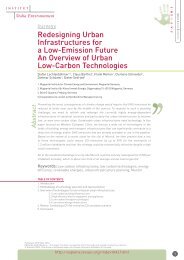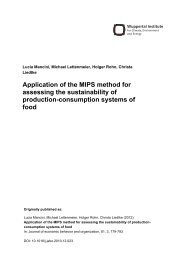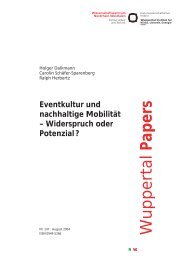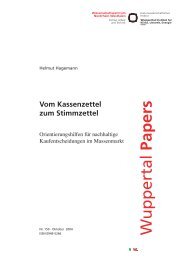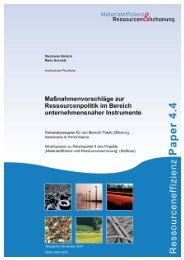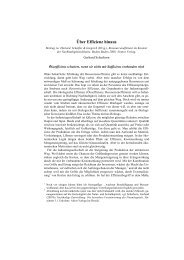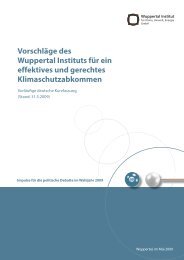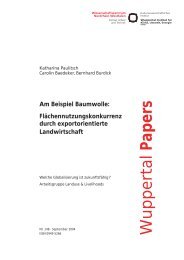- Seite 1 und 2: Christa Liedtke Kora Kristof Katrin
- Seite 3 und 4: MaRess - Inhalt des AP13-Abschlussb
- Seite 5 und 6: MaRess Christa - AP4 „Ressourcenp
- Seite 7 und 8: MaRess - AP4 „Ressourcenpolitik i
- Seite 9 und 10: MaRess - AP4 „Ressourcenpolitik i
- Seite 11 und 12: MaRess - AP4 „Ressourcenpolitik i
- Seite 13 und 14: MaRess - AP4 „Ressourcenpolitik i
- Seite 15 und 16: MaRess - AP4 „Ressourcenpolitik i
- Seite 17 und 18: MaRess - AP4 „Ressourcenpolitik i
- Seite 19 und 20: MaRess - AP4 „Ressourcenpolitik i
- Seite 21 und 22: MaRess - AP4 „Ressourcenpolitik i
- Seite 23 und 24: MaRess - AP4 „Ressourcenpolitik i
- Seite 25 und 26: MaRess - AP4 „Ressourcenpolitik i
- Seite 27 und 28: Kora Kristof Christa Liedtke Wupper
- Seite 29 und 30: MaRess - Task 4: Resource Policy in
- Seite 31 und 32: MaRess - Task 4: Resource Policy in
- Seite 33 und 34: MaRess - Task 4: Resource Policy in
- Seite 35 und 36: MaRess - Task 4: Resource Policy in
- Seite 37 und 38: MaRess - Task 4: Resource Policy in
- Seite 39 und 40: MaRess - Task 4: Resource Policy in
- Seite 41 und 42: MaRess - Task 4: Resource Policy in
- Seite 43: MaRess - Task 4: Resource Policy in
- Seite 47 und 48: MaRess - Task 4: Resource Policy in
- Seite 49 und 50: MaRess - AP4: Systematisierung unte
- Seite 51 und 52: MaRess - AP4: Systematisierung unte
- Seite 53 und 54: Abbildungen MaRess - AP4: Systemati
- Seite 55 und 56: Vorwort MaRess - AP4: Systematisier
- Seite 57 und 58: MaRess - AP4: Systematisierung unte
- Seite 59 und 60: MaRess - AP4: Systematisierung unte
- Seite 61 und 62: MaRess - AP4: Systematisierung unte
- Seite 63 und 64: MaRess - AP4: Systematisierung unte
- Seite 65 und 66: MaRess - AP4: Systematisierung unte
- Seite 67 und 68: MaRess - AP4: Systematisierung unte
- Seite 69 und 70: MaRess - AP4: Systematisierung unte
- Seite 71 und 72: MaRess - AP4: Systematisierung unte
- Seite 73 und 74: MaRess - AP4: Systematisierung unte
- Seite 75 und 76: MaRess - AP4: Systematisierung unte
- Seite 77 und 78: MaRess - AP4: Systematisierung unte
- Seite 79 und 80: MaRess - AP4: Systematisierung unte
- Seite 81 und 82: MaRess - AP4: Systematisierung unte
- Seite 83 und 84: MaRess - AP4: Systematisierung unte
- Seite 85 und 86: MaRess - AP4: Systematisierung unte
- Seite 87 und 88: MaRess - AP4: Systematisierung unte
- Seite 89 und 90: MaRess - AP4: Systematisierung unte
- Seite 91 und 92: MaRess - AP4: Systematisierung unte
- Seite 93 und 94: MaRess - AP4: Systematisierung unte
- Seite 95 und 96:
MaRess - AP4: Systematisierung unte
- Seite 97 und 98:
MaRess - AP4: Systematisierung unte
- Seite 99 und 100:
MaRess - AP4: Systematisierung unte
- Seite 101 und 102:
MaRess - AP4: Systematisierung unte
- Seite 103 und 104:
Adressierte Hemmnisse Praxiserfahru
- Seite 105 und 106:
MaRess - AP4: Systematisierung unte
- Seite 107 und 108:
MaRess - AP4: Systematisierung unte
- Seite 109 und 110:
MaRess - AP4: Systematisierung unte
- Seite 111 und 112:
MaRess - AP4: Systematisierung unte
- Seite 113 und 114:
MaRess - AP4: Systematisierung unte
- Seite 115 und 116:
MaRess - AP4: Systematisierung unte
- Seite 117 und 118:
MaRess - AP4: Systematisierung unte
- Seite 119 und 120:
6 Literatur MaRess - AP4: Systemati
- Seite 121 und 122:
MaRess - AP4: Systematisierung unte
- Seite 123 und 124:
Anhang MaRess - AP4: Systematisieru
- Seite 125:
MaRess - AP4: Systematisierung unte
- Seite 128 und 129:
Kontakt zu den Autor(inn)en: Stepha
- Seite 130 und 131:
Seite 4 MaRess - AP4: Stimmen aus d
- Seite 132 und 133:
Vorwort Seite 6 MaRess - AP4: Stimm
- Seite 134 und 135:
Seite 8 MaRess - AP4: Stimmen aus d
- Seite 136 und 137:
Seite 10 MaRess - AP4: Stimmen aus
- Seite 138 und 139:
Seite 12 MaRess - AP4: Stimmen aus
- Seite 140 und 141:
Seite 14 MaRess - AP4: Stimmen aus
- Seite 142 und 143:
Seite 16 MaRess - AP4: Stimmen aus
- Seite 144 und 145:
Finanzwirtschaftliche Instrumente S
- Seite 146 und 147:
Seite 20 MaRess - AP4: Stimmen aus
- Seite 148 und 149:
Seite 22 MaRess - AP4: Stimmen aus
- Seite 150 und 151:
Seite 24 MaRess - AP4: Stimmen aus
- Seite 152 und 153:
4 Interviewergebnisse Seite 26 MaRe
- Seite 154 und 155:
Seite 28 MaRess - AP4: Stimmen aus
- Seite 156 und 157:
Seite 30 MaRess - AP4: Stimmen aus
- Seite 158 und 159:
Seite 32 MaRess - AP4: Stimmen aus
- Seite 160 und 161:
Seite 34 MaRess - AP4: Stimmen aus
- Seite 162 und 163:
Seite 36 MaRess - AP4: Stimmen aus
- Seite 164 und 165:
Seite 38 MaRess - AP4: Stimmen aus
- Seite 166 und 167:
Seite 40 MaRess - AP4: Stimmen aus
- Seite 168 und 169:
Seite 42 MaRess - AP4: Stimmen aus
- Seite 170 und 171:
Seite 44 MaRess - AP4: Stimmen aus
- Seite 172 und 173:
Literatur Seite 46 MaRess - AP4: St
- Seite 174 und 175:
Seite 48 MaRess - AP4: Stimmen aus
- Seite 176 und 177:
Seite 50 MaRess - AP4: Stimmen aus
- Seite 178 und 179:
Anhang 2.1: F.W. Brökelmann Alumin
- Seite 180 und 181:
Anhang 2.2: Constantia Haendler & N
- Seite 182 und 183:
Seite 56 MaRess - AP4: Stimmen aus
- Seite 184 und 185:
Seite 58 MaRess - AP4: Stimmen aus
- Seite 186 und 187:
Seite 60 MaRess - AP4: Stimmen aus
- Seite 188 und 189:
Seite 62 MaRess - AP4: Stimmen aus
- Seite 190 und 191:
Anhang 2.7: Königsborner Drahtvera
- Seite 192 und 193:
Anhang 2.8: Otto Brenscheidt GmbH &
- Seite 194 und 195:
Anhang 2.9: Poetters + Schäfer Qua
- Seite 196 und 197:
Seite 70 MaRess - AP4: Stimmen aus
- Seite 199 und 200:
MaRess - AP4: Unternehmensnahe Inst
- Seite 201 und 202:
MaRess - AP4: Unternehmensnahe Inst
- Seite 203 und 204:
MaRess - AP4: Unternehmensnahe Inst
- Seite 205 und 206:
MaRess - AP4: Unternehmensnahe Inst
- Seite 207 und 208:
MaRess - AP4: Unternehmensnahe Inst
- Seite 209 und 210:
MaRess - AP4: Unternehmensnahe Inst
- Seite 211 und 212:
MaRess - AP4: Unternehmensnahe Inst
- Seite 213 und 214:
MaRess - AP4: Unternehmensnahe Inst
- Seite 215 und 216:
MaRess - AP4: Unternehmensnahe Inst
- Seite 217 und 218:
MaRess - AP4: Unternehmensnahe Inst
- Seite 219 und 220:
MaRess - AP4: Unternehmensnahe Inst
- Seite 221 und 222:
MaRess - AP4: Unternehmensnahe Inst
- Seite 223 und 224:
MaRess - AP4: Unternehmensnahe Inst
- Seite 225 und 226:
MaRess - AP4: Unternehmensnahe Inst
- Seite 227 und 228:
MaRess - AP4: Unternehmensnahe Inst
- Seite 229 und 230:
MaRess - AP4: Unternehmensnahe Inst
- Seite 231 und 232:
MaRess - AP4: Unternehmensnahe Inst
- Seite 233 und 234:
MaRess - AP4: Unternehmensnahe Inst
- Seite 235 und 236:
MaRess - AP4: Unternehmensnahe Inst
- Seite 237 und 238:
MaRess - AP4: Unternehmensnahe Inst
- Seite 239 und 240:
MaRess - AP4: Unternehmensnahe Inst
- Seite 241 und 242:
MaRess - AP4: Unternehmensnahe Inst
- Seite 243 und 244:
MaRess - AP4: Unternehmensnahe Inst
- Seite 245 und 246:
MaRess - AP4: Unternehmensnahe Inst
- Seite 247 und 248:
MaRess - AP4: Unternehmensnahe Inst
- Seite 249 und 250:
MaRess - AP4: Unternehmensnahe Inst
- Seite 251 und 252:
MaRess - AP4: Unternehmensnahe Inst
- Seite 253 und 254:
MaRess - AP4: Unternehmensnahe Inst
- Seite 255 und 256:
MaRess - AP4: Unternehmensnahe Inst
- Seite 257 und 258:
MaRess - AP4: Unternehmensnahe Inst
- Seite 259 und 260:
MaRess - AP4: Unternehmensnahe Inst
- Seite 261 und 262:
MaRess - AP4: Unternehmensnahe Inst
- Seite 263 und 264:
MaRess - AP4: Unternehmensnahe Inst
- Seite 265 und 266:
MaRess - AP4: Unternehmensnahe Inst
- Seite 267 und 268:
MaRess - AP4: Unternehmensnahe Inst
- Seite 269 und 270:
MaRess - AP4: Unternehmensnahe Inst
- Seite 271 und 272:
MaRess - AP4: Unternehmensnahe Inst
- Seite 273 und 274:
MaRess - AP4: Unternehmensnahe Inst
- Seite 275 und 276:
MaRess - AP4: Unternehmensnahe Inst
- Seite 277 und 278:
MaRess - AP4: Unternehmensnahe Inst
- Seite 279 und 280:
Stephanie Görlach Mario Schmidt Ho
- Seite 281 und 282:
MaRess - AP4: Unternehmensnahe Inst
- Seite 283 und 284:
MaRess - AP4: Unternehmensnahe Inst
- Seite 285 und 286:
MaRess - AP4: Unternehmensnahe Inst
- Seite 287 und 288:
MaRess - AP4: Unternehmensnahe Inst
- Seite 289 und 290:
MaRess - AP4: Unternehmensnahe Inst
- Seite 291 und 292:
MaRess - AP4: Unternehmensnahe Inst
- Seite 293 und 294:
MaRess - AP4: Unternehmensnahe Inst
- Seite 295 und 296:
MaRess - AP4: Unternehmensnahe Inst
- Seite 297 und 298:
MaRess - AP4: Unternehmensnahe Inst
- Seite 299 und 300:
MaRess - AP4: Unternehmensnahe Inst
- Seite 301 und 302:
MaRess - AP4: Unternehmensnahe Inst
- Seite 303 und 304:
MaRess - AP4: Unternehmensnahe Inst
- Seite 305 und 306:
MaRess - AP4: Unternehmensnahe Inst
- Seite 307 und 308:
MaRess - AP4: Unternehmensnahe Inst
- Seite 309 und 310:
MaRess - AP4: Unternehmensnahe Inst
- Seite 311 und 312:
MaRess - AP4: Unternehmensnahe Inst
- Seite 313 und 314:
MaRess - AP4: Unternehmensnahe Inst
- Seite 315 und 316:
MaRess - AP4: Unternehmensnahe Inst
- Seite 317 und 318:
MaRess - AP4: Unternehmensnahe Inst
- Seite 319 und 320:
MaRess - AP4: Unternehmensnahe Inst
- Seite 321 und 322:
MaRess - AP4: Unternehmensnahe Inst
- Seite 323 und 324:
MaRess - AP4: Unternehmensnahe Inst
- Seite 325 und 326:
MaRess - AP4: Unternehmensnahe Inst
- Seite 327 und 328:
MaRess - AP4: Unternehmensnahe Inst
- Seite 329 und 330:
MaRess - AP4: Unternehmensnahe Inst
- Seite 331 und 332:
MaRess - AP4: Unternehmensnahe Inst
- Seite 333 und 334:
MaRess - AP4: Unternehmensnahe Inst
- Seite 335 und 336:
MaRess - AP4: Unternehmensnahe Inst
- Seite 337 und 338:
MaRess - AP4: Unternehmensnahe Inst
- Seite 339 und 340:
MaRess - AP4: Unternehmensnahe Inst
- Seite 341 und 342:
MaRess - AP4: Unternehmensnahe Inst
- Seite 343 und 344:
MaRess - AP4: Unternehmensnahe Inst
- Seite 345 und 346:
MaRess - AP4: Unternehmensnahe Inst
- Seite 347 und 348:
MaRess - AP4: Unternehmensnahe Inst
- Seite 349 und 350:
MaRess - AP4: Unternehmensnahe Inst
- Seite 351 und 352:
MaRess - AP4: Unternehmensnahe Inst
- Seite 353 und 354:
MaRess - AP4: Unternehmensnahe Inst
- Seite 355 und 356:
MaRess - AP4: Unternehmensnahe Inst
- Seite 357 und 358:
MaRess - AP4: Unternehmensnahe Inst
- Seite 359 und 360:
MaRess - AP4: Unternehmensnahe Inst
- Seite 361 und 362:
MaRess - AP4: Unternehmensnahe Inst
- Seite 363 und 364:
MaRess - AP4: Unternehmensnahe Inst
- Seite 365 und 366:
MaRess - AP4: Unternehmensnahe Inst
- Seite 367 und 368:
MaRess - AP4: Unternehmensnahe Inst
- Seite 369 und 370:
MaRess - AP4: Unternehmensnahe Inst
- Seite 371 und 372:
MaRess - AP4: Unternehmensnahe Inst
- Seite 373 und 374:
MaRess - AP4: Unternehmensnahe Inst
- Seite 375 und 376:
MaRess - AP4: Unternehmensnahe Inst
- Seite 377 und 378:
MaRess - AP4: Unternehmensnahe Inst
- Seite 379 und 380:
MaRess - AP4: Feinanalysepaper für
- Seite 381 und 382:
MaRess - AP4: Feinanalysepaper für
- Seite 383 und 384:
Abbildungen MaRess - AP4: Feinanaly
- Seite 385 und 386:
Kurzfassung MaRess - AP4: Feinanaly
- Seite 387 und 388:
MaRess - AP4: Feinanalysepaper für
- Seite 389 und 390:
MaRess - AP4: Feinanalysepaper für
- Seite 391 und 392:
1 Einleitung MaRess - AP4: Feinanal
- Seite 393 und 394:
MaRess - AP4: Feinanalysepaper für
- Seite 395 und 396:
MaRess - AP4: Feinanalysepaper für
- Seite 397 und 398:
MaRess - AP4: Feinanalysepaper für
- Seite 399 und 400:
MaRess - AP4: Feinanalysepaper für
- Seite 401 und 402:
MaRess - AP4: Feinanalysepaper für
- Seite 403 und 404:
MaRess - AP4: Feinanalysepaper für
- Seite 405 und 406:
MaRess - AP4: Feinanalysepaper für
- Seite 407 und 408:
MaRess - AP4: Feinanalysepaper für
- Seite 409 und 410:
MaRess - AP4: Feinanalysepaper für
- Seite 411 und 412:
MaRess - AP4: Feinanalysepaper für
- Seite 413 und 414:
MaRess - AP4: Feinanalysepaper für
- Seite 415 und 416:
MaRess - AP4: Feinanalysepaper für
- Seite 417 und 418:
MaRess - AP4: Feinanalysepaper für
- Seite 419 und 420:
MaRess - AP4: Feinanalysepaper für
- Seite 421 und 422:
MaRess - AP4: Feinanalysepaper für
- Seite 423 und 424:
MaRess - AP4: Feinanalysepaper für
- Seite 425 und 426:
MaRess - AP4: Feinanalysepaper für
- Seite 427 und 428:
4.1.1 Hintergrund MaRess - AP4: Fei
- Seite 429 und 430:
MaRess - AP4: Feinanalysepaper für
- Seite 431 und 432:
MaRess - AP4: Feinanalysepaper für
- Seite 433 und 434:
MaRess - AP4: Feinanalysepaper für
- Seite 435 und 436:
MaRess - AP4: Feinanalysepaper für
- Seite 437 und 438:
MaRess - AP4: Feinanalysepaper für
- Seite 439 und 440:
MaRess - AP4: Feinanalysepaper für
- Seite 441 und 442:
MaRess - AP4: Feinanalysepaper für
- Seite 443 und 444:
MaRess - AP4: Feinanalysepaper für
- Seite 445 und 446:
MaRess - AP4: Feinanalysepaper für
- Seite 447 und 448:
MaRess - AP4: Feinanalysepaper für
- Seite 449 und 450:
MaRess - AP4: Feinanalysepaper für
- Seite 451 und 452:
MaRess - AP4: Feinanalysepaper für
- Seite 453 und 454:
MaRess - AP4: Feinanalysepaper für
- Seite 455 und 456:
MaRess - AP4: Feinanalysepaper für
- Seite 457 und 458:
MaRess - AP4: Feinanalysepaper für
- Seite 459 und 460:
MaRess - AP4: Feinanalysepaper für
- Seite 461 und 462:
MaRess - AP4: Feinanalysepaper für
- Seite 463 und 464:
MaRess - AP4: Feinanalysepaper für
- Seite 465 und 466:
MaRess - AP4: Feinanalysepaper für
- Seite 467 und 468:
MaRess - AP4: Feinanalysepaper für
- Seite 469 und 470:
MaRess - AP4: Feinanalysepaper für
- Seite 471 und 472:
MaRess - AP4: Feinanalysepaper für
- Seite 473 und 474:
MaRess - AP4: Feinanalysepaper für
- Seite 475 und 476:
MaRess - AP4: Feinanalysepaper für
- Seite 477 und 478:
MaRess - AP4: Feinanalysepaper für
- Seite 479 und 480:
MaRess - AP4: Feinanalysepaper für
- Seite 481 und 482:
MaRess - AP4: Feinanalysepaper für
- Seite 483 und 484:
Allgemeine Zielsetzungen MaRess - A
- Seite 485 und 486:
MaRess - AP4: Feinanalysepaper für
- Seite 487 und 488:
MaRess - AP4: Feinanalysepaper für
- Seite 489 und 490:
MaRess - AP4: Feinanalysepaper für
- Seite 491 und 492:
MaRess - AP4: Feinanalysepaper für
- Seite 493 und 494:
MaRess - AP4: Feinanalysepaper für
- Seite 495:
6 Anhang MaRess - AP4: Feinanalysep
- Seite 498 und 499:
MaRess - AP4: Maßnahmenvorschläge
- Seite 500 und 501:
Seite 2 MaRess - AP4: Maßnahmenvor
- Seite 502 und 503:
Seite 4 MaRess - AP4: Maßnahmenvor
- Seite 504 und 505:
Seite 6 MaRess - AP4: Maßnahmenvor
- Seite 506 und 507:
Seite 8 MaRess - AP4: Maßnahmenvor
- Seite 508 und 509:
MaRess - AP4: Maßnahmenvorschläge
- Seite 510 und 511:
MaRess - AP4: Maßnahmenvorschläge
- Seite 512 und 513:
MaRess - AP4: Maßnahmenvorschläge
- Seite 514 und 515:
MaRess - AP4: Maßnahmenvorschläge
- Seite 516 und 517:
MaRess - AP4: Maßnahmenvorschläge
- Seite 518 und 519:
MaRess - AP4: Maßnahmenvorschläge
- Seite 520 und 521:
MaRess - AP4: Maßnahmenvorschläge
- Seite 522 und 523:
MaRess - AP4: Maßnahmenvorschläge
- Seite 524 und 525:
MaRess - AP4: Maßnahmenvorschläge
- Seite 526 und 527:
MaRess - AP4: Maßnahmenvorschläge
- Seite 528 und 529:
MaRess - AP4: Maßnahmenvorschläge
- Seite 530 und 531:
MaRess - AP4: Maßnahmenvorschläge
- Seite 532 und 533:
MaRess - AP4: Maßnahmenvorschläge
- Seite 534 und 535:
MaRess - AP4: Maßnahmenvorschläge
- Seite 536 und 537:
MaRess - AP4: Maßnahmenvorschläge
- Seite 538 und 539:
MaRess - AP4: Maßnahmenvorschläge
- Seite 540 und 541:
MaRess - AP4: Maßnahmenvorschläge
- Seite 542 und 543:
MaRess - AP4: Maßnahmenvorschläge
- Seite 544 und 545:
MaRess - AP4: Maßnahmenvorschläge
- Seite 547 und 548:
MaRess - AP4 „Spezifische Politik
- Seite 549 und 550:
Inhalt MaRess - AP4 „Spezifische
- Seite 551 und 552:
MaRess - AP4 „Spezifische Politik
- Seite 553 und 554:
MaRess - AP4 „Spezifische Politik
- Seite 555 und 556:
MaRess - AP4 „Spezifische Politik
- Seite 557 und 558:
MaRess - AP4 „Spezifische Politik
- Seite 559 und 560:
MaRess - AP4 „Spezifische Politik
- Seite 561 und 562:
MaRess - AP4 „Spezifische Politik
- Seite 563 und 564:
MaRess - AP4 „Spezifische Politik
- Seite 565 und 566:
MaRess - AP4 „Spezifische Politik
- Seite 567 und 568:
MaRess - AP4 „Spezifische Politik
- Seite 569 und 570:
MaRess - AP4 „Spezifische Politik
- Seite 571 und 572:
MaRess - AP4 „Spezifische Politik
- Seite 573 und 574:
MaRess - AP4 „Spezifische Politik
- Seite 575 und 576:
MaRess - AP4 „Spezifische Politik
- Seite 577 und 578:
MaRess - AP4 „Spezifische Politik
- Seite 579 und 580:
MaRess - AP4 „Spezifische Politik
- Seite 581 und 582:
MaRess - AP4 „Spezifische Politik
- Seite 583 und 584:
MaRess - AP4 „Spezifische Politik
- Seite 585 und 586:
MaRess - AP4 „Spezifische Politik
- Seite 587 und 588:
MaRess - AP4 „Spezifische Politik
- Seite 589 und 590:
MaRess - AP4 „Spezifische Politik
- Seite 591 und 592:
MaRess - AP4 „Spezifische Politik
- Seite 593 und 594:
MaRess - AP4 „Spezifische Politik
- Seite 595 und 596:
MaRess - AP4 „Spezifische Politik
- Seite 597 und 598:
MaRess - AP4 „Spezifische Politik
- Seite 599 und 600:
MaRess - AP4 „Spezifische Politik
- Seite 601 und 602:
MaRess - AP4 „Spezifische Politik
- Seite 603 und 604:
MaRess - AP4 „Spezifische Politik
- Seite 605 und 606:
MaRess - AP4 „Spezifische Politik
- Seite 607 und 608:
MaRess - AP4 „Spezifische Politik
- Seite 609 und 610:
MaRess - AP4 „Spezifische Politik
- Seite 611 und 612:
MaRess - AP4 „Spezifische Politik
- Seite 613 und 614:
MaRess - AP4 „Spezifische Politik
- Seite 615 und 616:
MaRess - AP4 „Spezifische Politik
- Seite 617 und 618:
MaRess - AP4 „Spezifische Politik
- Seite 619 und 620:
MaRess - AP4 „Spezifische Politik
- Seite 621:
MaRess - AP4 „Spezifische Politik


